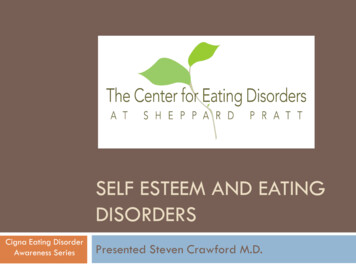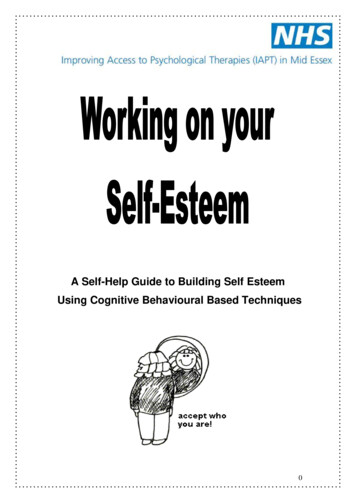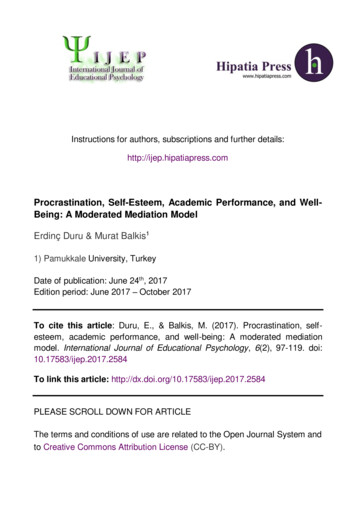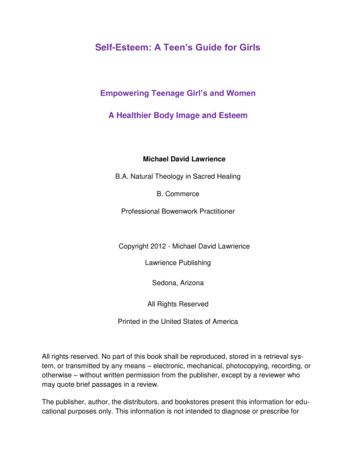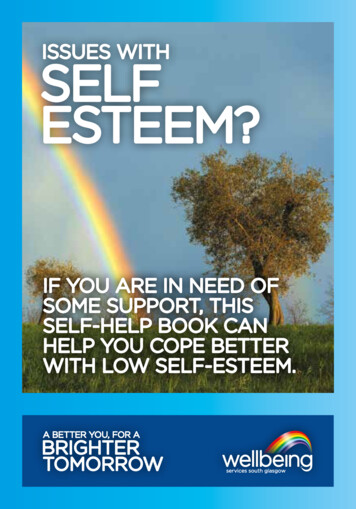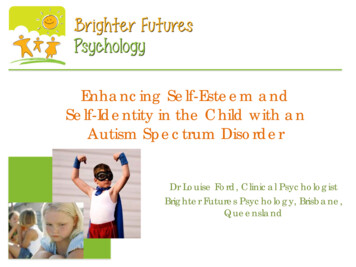
Transcription
Enhancing Self-Esteem andSelf-Identity in the Child with anAutism Spectrum DisorderDr Louise Ford, Clinical PsychologistBrighter Futures Psychology, Brisbane,Queensland
Overview What is self-esteem? What causes low self-esteem in children on thespectrum? What is self-identity? Why do children with ASD have difficulties with self-identity? What can be done to enhance the self-esteem of a child with anASD? What can be done to ensure a positive self-identity? How to share an ASD diagnosis to promote acceptance andenhance positive responses Two group programs designed to enhance self-esteem and selfidentity Helpful resources for promoting self-esteem and self-identity
What is self-esteem? One’s overall emotional evaluation of his or her self-worth andself-value - can be positive or negative Appraisals of one’s appearance, beliefs, emotions, behaviours Judgement of oneself and attitude towards the self Encompasses beliefs about the self and resultant emotions Closely related to psychological well-being Abraham Maslow’s Hierarchy of Needs: 1. Physiological, 2.Security, 3. Social, 4. Esteem, 5. Self-Actualisation Successful peer relationships paramount to development ofhealthy self-esteem for children. Social acceptance confidence and high self-esteem.Rejection & loneliness self-doubt and low self-esteem
Causes of low self-esteem in ASD Noticing differences from peers – interests, dress sense, socialinteractions Negative comparisons – comparing self to others & theirdifficulties with other’s strengths Thinking globally “Everything is harder for me” Negative self-talk – overly self-critical – focus on theirdifficulties See themselves as needing “fixing” Frequent visits to GPs, specialists, therapists “somethingwrong with me” Miss jokes & sarcasm perception that they have a problem Differences defects
Causes of low self-esteem in ASD Well-meaning comments on behaviour / suggestionsperceived as criticism Mistakes akin to failure – fear of trying Stand out from crowd, feel on the outer/periphery - not partof the “in crowd/group” Teasing and bullying – predators of playground prey on them– alone, vulnerable, weak Excluded - no party or play date invites, left out of games &conversations – some notice others don’t
Signs of low self-esteem Speaking negatively about self – “I’m stupid”, “I can’t doanything right”, “I’m not even going to bother trying becauseI know I’ll get it wrong”, “I’m the worst in the world” Difficulty taking criticism or feedback Pessimism, negativity – low mood & withdrawal Reluctance to try something new for fear of getting it wrong fear of mistake making Reluctant to seek help or tell people don’t understand Give up easily & want others to do things for them Perfectionism but often never satisfied because can’tachieve high expectations set themselves
What is Self-Identity/Concept? Answers the question “who am I?” What one thinks or believes about him/herself Encompasses physical appearance, goals, personalitycharacteristics, likes and dislikes, skills and abilities Different to self-esteem Self-concept – “I do well in Maths” (what we believe or think) Self-esteem – “I feel good about my Mathematical abilities”(how we feel about it)
Why do children with ASD havedifficulties with self-identity? Difficulties with describing character and personality traits wellknown – often form part of diagnostic assessment e.g. “whatsort of a person is your Mum?” or “what sort of a person areyou?” Difficulties with introspecting and describing thoughts andfeelings Often extensive vocabulary yet limited vocabulary fordescribing personality traits Find people difficult to understand so understandingthemselves is even harder
Strategies to enhance self-esteem Be a good role model Celebrate difference & uniqueness in general – do this from ayoung age Positive affirmations – I think, I am. Encourage & rewardpositive self-talk Point out positives associated with ASD not just negatives Positive scrapbook celebrating achievements Certificates, photos of achievements, compliments, qualities - one wordto a page, special interests“That doesn’t sound like the Jack I know” Praise and reward efforts and attempts not just successes –emphasise effort column when reviewing report card
Strategies to enhance self-esteem?Expert on a topic – present to the classGood with computers – “go to” IT person for the classStrength in Maths – go back to previous year level to assistWarm fuzzy activity – have peers provide compliments &record in positives book Extra curricular activities based on child’s strengths & toprovide opportunities to mix with like-minded peers. Tryindividual pursuits, martial arts, scouts, art classes. Emphasise strengths - strength based activities e.g. strengthcards Help out with a task at home – pitched at their level that canhave success at - increases confidence
Strategies to enhance self-esteem Have others in extended family & friends say what like aboutchild & record in positives book Work on view of mistake making – Mistakes that worked book,normalising Finished box or tick chart for tasks – sense of accomplishment& achievement Classroom – different assessment modes, typing rather thanwriting, assignment on their topic Mentor to younger students in area of strength Zero tolerance on bullying – teach skills here & resilience Special interest great source of self-esteem
Things I like vs find hard about being meTHINGS I LIKE That I’m good at Maths That I have Mrs Little for a teacher and she reads me the 13Story Tree House That I have a really cool fort with swings That I like my dogs Cindy and Ebony and I like feeding themTHINGS I FIND HARD I find writing really tricky because I forget what I was going towrite and I am slow That I find it hard to get ready for school in the mornings
Things I am good at. LegoRemembering thingsComputers & PS4Sense of smellTae Kwon DoArtGood pet ownerComing up with cool ideasLifting things (strong)Cataloging thingsNoticing details & mistakesReading maps
Strategies to develop a positiveself-identity Project on self who am I? – cultural heritage, appearance, likes,dislikes, goals, strengths, difficulties, personality characteristics Point out personality qualities you see in them e.g. “You are socreative Sebastian!” or “You are such a loyal friend to Sammy” Representation of self through music, art, poem, stories Help them to better understand and celebrate their differencesand therefore their ASD “I’m the sort of person who .” has difficulty with social chit chatlikes to eat my lunch in a quiet areaprefers typing than writinglikes to know things ahead of timeenjoys having time by myself sometimes rather than being in a group all thetime
Personality qualities bleStrong-willedThoughtfulTrustworthyA good rested in othersA good Loyal
Sharing the diagnosis in the clinic Timing is everything – questioning why different – if left too longmay jump to conclusion that different defective Need to jump in here to ensure an accurate perception 99% time goes well Need rapport first Can involve family - strengths and difficulties in family membersand individual Pattern identified by Hans Asperger in 1940s – named afterhimself Pieces of a 100 piece jigsaw puzzle – everyone has pieces Brain wired differently Emphasising difference not defect
Sharing the diagnosisCARD SORT ACTIVITYStrengthsGood with computersHonestfeelingSpeak your mindLoyal friendNoticing detailsMemory for factsExpert on a topicNotice sounds others don’tUnderstanding how things workDifficultiesHandwritingKnowing what someone else isManaging emotionsMaking and keeping friendsSportyFashion senseBullyingOrganisational skillsConversations
Sharing the diagnosis Explaining why we don’t share with everyone – ignorance –super power Clark Kent vs Superman May read All Cats Have AS, Different Like Me, It’s anAsperger’s Thing Famous people with AS in child’s area of interest Don’t make too big a deal of it – let them come to you forquestions, leave some books around, bring it up generally –not specific to them e.g. positive news story, charity day atschool, amazing engineering feat
For educators Embrace & celebrate different abilities – attitude fromeducators towards child on spectrum flows on to otherchildren. Don’t tolerate teasing, put downs, criticismamongst all children. May use Sixth Sense or My Friend Has Asperger’s or It’s anAsperger’s Thing to assist peers to better understand ASDor project on famous individuals throughout history withAS & their contributions Speak generally about everyone having strengths andchallenges Find opportunities to promote the child’s strengths andabilities e.g. “Did everyone hear the fantastic poem Fredwrote about owls?”
Group programs to enhance selfesteem & self-identity 7-9 year old girls group program Teenage girls group program Both focus on self-concept & self-esteem, as well asembracing and celebrating difference Activities such as: Write an advertisement about themselves describing physicalcharacteristics, personality traits, strengths and difficulties, likes anddislikes and goals.Emphasising differences and celebrating these e.g. different interests,different families, different modes of schooling – all okay!Looking at difference between ideal versus actual self and dangers ofthere being too much disparity between the two
Knowing when to seek help May like to work on some of these ideas yourself – add togreat work already doing May need to engage with a psychologist to provide furtherhelp (concerned re low mood, anxiety, bullying etc) –someone outside of family helpful, own time devoted to them Seek out specialist in ASD rather than generalist psychologistwhere possible – slight differences in approach with ASDchildren Psychologists can also help with social skills & emotionmanagement difficulties, dealing with bullying, organisationalskills difficulties, enhancing perspective taking abilities etc 10 individual and 10 group Medicare rebated sessions peryear
Helpful resources A smart girl’s guide to liking herself – even on the bad days byLaurie Zelinger Different like me: My book of autism heroes by Jennifer Elder All cats have Asperger’s by Kathy Hoopmann My friend has Asperger’s by Amanda Curtis The sixth sense by Carol Gray My happy book by Kikki K Understanding Sam and Asperger’s Syndrome byClarabelle van Niekerk I think, I am by Louise Hay Strength cards for kids The things I love about me by Trace Maroney Mistakes that worked by Charlotte Foltz Jones
Question time Dr Louise FordClinical PsychologistBrighter Futures PsychologyPO Box 47 CAMP HILL QLD 41520400 713 hterfuturespsychology.com.au
Security, 3. Social, 4. Esteem, 5. Self-Actualisation Successful peer relationships paramount to development of healthy self-esteem for children. Social acceptance confidence and high self-esteem. Rejection & loneliness self-do



